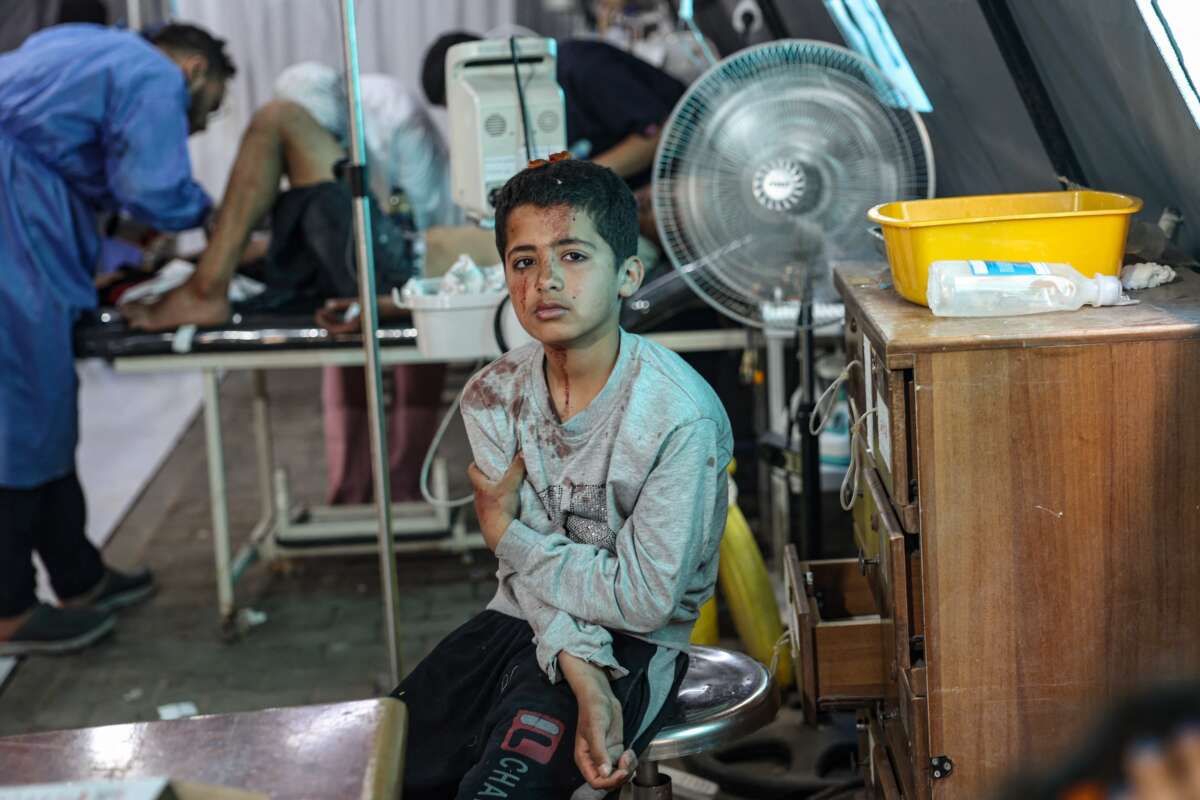Israeli forces have not allowed medical aid to enter Gaza for over 10 days, UN officials have warned, with Israel’s near-total blockade of humanitarian aid at Gaza border crossings threatening the lives of hundreds of thousands of Palestinians.
On Friday, World Health Organization (WHO) spokesperson Tarik Jašarević said that “the last medical supplies that we got in Gaza was before May 6,” adding, “we don’t have fuel, we have hospitals that are under evacuation order, we have a situation where we cannot move physically.”
The comment is yet another show of how dire conditions are in Gaza as Israel works to systematically dismantle the humanitarian aid and health systems in the region. For months, Israel’s extreme restrictions on medical aid entering Gaza have left medical staff unable to provide patients with many basic aspects of care. The blockade has also forced Palestinians, many of whom have been injured by Israel’s relentless bombing campaign, to endure surgeries without anesthetic, including C-sections and amputations that would be unnecessary if medical facilities had proper materials.
Hospitals that haven’t been destroyed by Israeli forces are completely overrun, and seeing an influx of patients and bodies as Israel has escalated its genocide in recent weeks. Israel has been deliberately targeting medical workers in attacks, having committed over 400 recorded incidents of attacks against health care workers and facilities since October, and now blocking international doctors on medical missions from entering the region.
Israel’s closure of the Rafah crossing has been a major factor contributing to its near-total aid blockade. Prior to last week, the crossing was the primary entry point for aid, including medical aid, but it has been closed for nearly two weeks and taken over by Israeli forces.
Perhaps more so than the lack of medical supplies, Israel’s prohibition of fuel is threatening to totally collapse the medical system. Humanitarian workers have warned that all hospitals in Gaza are at imminent risk of shutdown because of the fuel shortage, which prevents hospitals from being able to keep the lights on while also preventing aid workers from being able to deliver life-saving supplies in the first place.
It is unclear how much fuel is left in the region, but UN groups are warning they’re set to run out in just days. As of Thursday, 11 bakeries in southern Gaza have been forced to cease operations due to a lack of fuel, leaving only five bakeries left open across the entire Gaza Strip, according to the UN Office for Coordination of Humanitarian affairs.
Meanwhile, epidemics of illnesses like hepatitis are already spreading across Gaza and an unknown amount of people are dying due to Israel’s famine campaign.
The World Food Programme (WFP) said on Thursday that its food distributions in Rafah have come to a halt, while the famine has “never loomed larger” due to Israel’s Rafah assault. The only way to stop the famine from getting worse is a major influx of humanitarian aid, aid groups say, as well as an immediate, permanent ceasefire.
On Friday, U.S. officials said the U.S. military had finished setting up a floating pier off of the coast that they say will serve as another entry point for humanitarian aid. At full capacity, the pier is expected to be able to bring 150 trucks of aid into Gaza each day, if Israel allows.
But the pier has been harshly criticized for being nothing more than a PR stunt from U.S. officials to distract from the obvious, least expensive and most simple solution to the humanitarian crisis manufactured by Israel: for the U.S. to facilitate an immediate ceasefire and compel Israel to allow aid to flow freely into Gaza.
Our most important fundraising appeal of the year
December is the most critical time of year for Truthout, because our nonprofit news is funded almost entirely by individual donations from readers like you. So before you navigate away, we ask that you take just a second to support Truthout with a tax-deductible donation.
This year is a little different. We are up against a far-reaching, wide-scale attack on press freedom coming from the Trump administration. 2025 was a year of frightening censorship, news industry corporate consolidation, and worsening financial conditions for progressive nonprofits across the board.
We can only resist Trump’s agenda by cultivating a strong base of support. The right-wing mediasphere is funded comfortably by billionaire owners and venture capitalist philanthropists. At Truthout, we have you.
We’ve set an ambitious target for our year-end campaign — a goal of $250,000 to keep up our fight against authoritarianism in 2026. Please take a meaningful action in this fight: make a one-time or monthly donation to Truthout before December 31. If you have the means, please dig deep.
